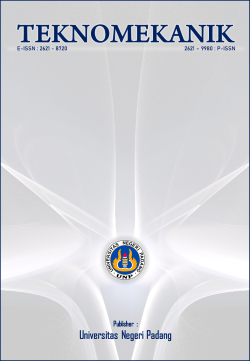Modified sorbents based on natural mineral and its mechanical properties
DOI:
https://doi.org/10.24036/jptk.v7i4.39123Keywords:
Natural sorbents, Technogenic solutions, Sorption, Extraction rateAbstract
The use of modified sorbents based on natural minerals, widely distributed in Kazakhstan, is a promising direction. This direction is related to the development of domestic ion-exchange materials. The republic lacks its own production of synthetic sorbents. The environmental situation in the regions of uranium ore mining and processing is also important. Moreover, the application of synthetic sorbents is not always justified due to their high cost, while the use of natural sorbents is limited by their low sorption capacity. The development of modified ion-exchange materials based on a combination of these is a pressing issue for various industries. Research has been conducted on the choice of modification methods for natural sorbents and the evaluation of their sorption capacity after modification. The modification of natural minerals zeolite and shungite using the "solid-phase extractants" method was carried out in two stages. At the first stage, the modification was performed with organic extractants and compositions based on them, and at the second stage with phosphoric acid in combination with polyacrylamide. The natural sorbents used were zeolite from the Kusmuryn deposit and shungite from the Koksu deposit, following preliminary flotation. The mechanical strength of sorbents modified by different methods was compared with the original ion-exchange materials. Studies of the sorption process have shown that the best results for uranium sorption were obtained with modified sorbents: zeolite modified with a mixture of extractants Di-2-Ethylhexyl phosphoric acid (Di-2-EHPA), Tributyl phosphate (TBP), kerosene, and shungite modified with phosphoric acid in the presence of Polyacrylamide (PAA).
Downloads
References
Abbasi, W. A., & Streat, M. (1994). Adsorption of Uranium from Aqueous Solutions Using Activated Carbon. Separation Science and Technology, 29(9), 1217–1230. https://doi.org/10.1080/01496399408005627
Bhattacharyya, K. G., & Gupta, S. Sen. (2011). Removal of Cu(II) by natural and acid-activated clays: An insight of adsorption isotherm, kinetic and thermodynamics. Desalination, 272(1–3), 66–75. https://doi.org/10.1016/j.desal.2011.01.001
Borai, E. H., Hilal, M. A., Attallah, M. F., & Shehata, F. A. (2008). Improvement of radioactive liquid waste treatment efficiency by sequential cationic and anionic ion exchangers. Radiochimica Acta, 96(7), 441–447. https://doi.org/10.1524/ract.2008.1506
Chen, L., Wang, Y., Yuan, X., Ren, Y., Liu, N., Yuan, L., & Feng, W. (2018). Highly selective extraction of uranium from nitric acid medium with phosphine oxide functionalized pillar[5]arenes in room temperature ionic liquid. Separation and Purification Technology, 192, 152–159. https://doi.org/10.1016/j.seppur.2017.10.011
Elizondo, N. V., Ballesteros, E., & Kharisov, B. I. (2000). Cleaning of liquid radioactive wastes using natural zeolites. Applied Radiation and Isotopes, 52(1), 27–30. https://doi.org/10.1016/S0969-8043(99)00110-4
Gaillard, C., Chaumont, A., Billard, I., Hennig, C., Ouadi, A., Georg, S., & Wipff, G. (2010). Competitive complexation of nitrates and chlorides to uranyl in a room temperature ionic liquid. Inorganic Chemistry, 49(14). https://doi.org/10.1021/ic100170t
Hassan, R. S., Abass, M. R., Eid, M. A., & Abdel-Galil, E. A. (2021). Sorption of some radionuclides from liquid waste solutions using anionic clay hydrotalcite sorbent. Applied Radiation and Isotopes, 178, 109985. https://doi.org/10.1016/j.apradiso.2021.109985
Hua, M., Zhang, S., Pan, B., Zhang, W., Lv, L., & Zhang, Q. (2012). Heavy metal removal from water/wastewater by nanosized metal oxides: A review. Journal of Hazardous Materials, 211–212, 317–331. https://doi.org/10.1016/j.jhazmat.2011.10.016
Jiang, M., Wang, Q., Jin, X., & Chen, Z. (2009). Removal of Pb(II) from aqueous solution using modified and unmodified kaolinite clay. Journal of Hazardous Materials, 170(1), 332–339. https://doi.org/10.1016/j.jhazmat.2009.04.092
Kenzhaliev B.K, Surkova T.Yu, Berkinbaуeva A.N, Dosymbayeva Z.D, & Chukmanova M.T. (2019). To the question of recovery of uranium from raw materials. NEWS of National Academy of Sciences of the Republic of Kazakhstan, 1(433), 112–119. https://doi.org/10.32014/2019.2518-170X.14
Krupskaya, V., Boguslavskiy, A., Zakusin, S., Shemelina, O., Chernov, M., Dorzhieva, O., & Morozov, I. (2020). The Influence of Liquid Low-Radioactive Waste Repositories on the Mineral Composition of Surrounding Soils. Sustainability, 12(19), 8259. https://doi.org/10.3390/su12198259
Misaelides, P. (2011). Application of natural zeolites in environmental remediation: A short review. Microporous and Mesoporous Materials, 144(1–3), 15–18. https://doi.org/10.1016/j.micromeso.2011.03.024
Nekrasova, N. A., Milyutin, V. V., Kaptakov, V. O., & Kozlitin, E. A. (2023). Inorganic Sorbents for Wastewater Treatment from Radioactive Contaminants. Inorganics, 11(3), 126. https://doi.org/10.3390/inorganics11030126
Osmanlioglu, A. E. (2006). Treatment of radioactive liquid waste by sorption on natural zeolite in Turkey. Journal of Hazardous Materials, 137(1), 332–335. https://doi.org/10.1016/j.jhazmat.2006.02.013
Downloads
Published
How to Cite
Issue
Section
License
Copyright (c) 2024 Kenzhaliyev Bagdaulet Kenzhalievich, Surkova Tatiana, Zamzagul Dossymbayeva, Koizhanova Aigul Kairgeldyevna, Yessimova Dinara, Abdikerim Bekzat

This work is licensed under a Creative Commons Attribution 4.0 International License.





